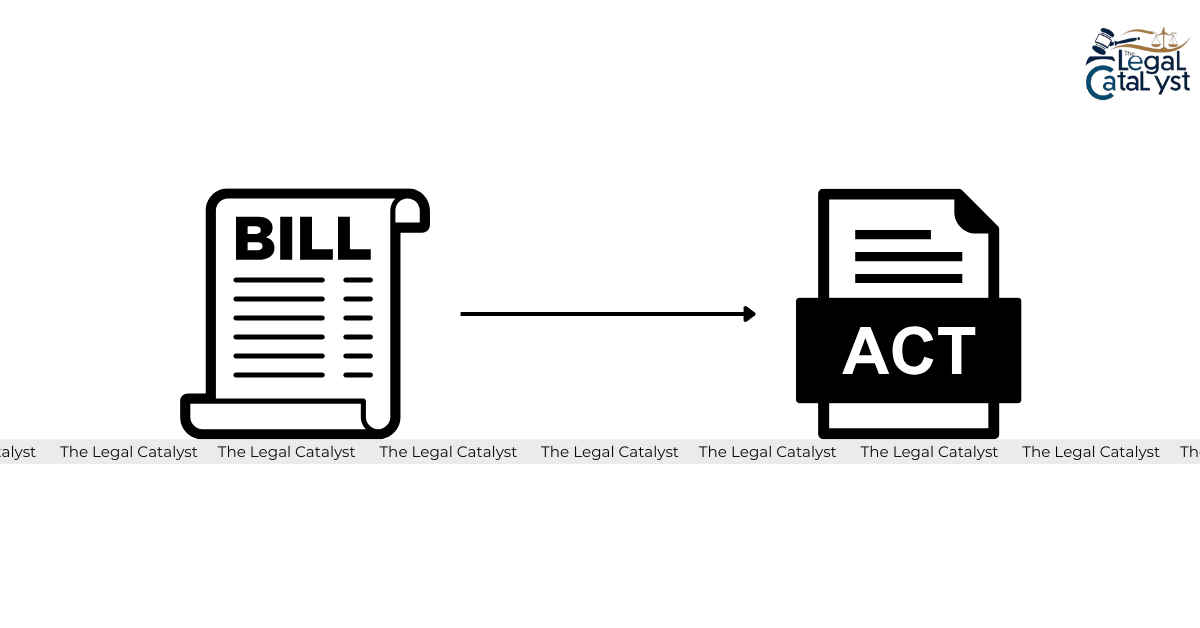Ever wondered how a law actually comes into existence in India? The journey of a bill becoming an act involves heated debates in Parliament. It concludes with the final signature by the President. This journey is both structured and significant. In a democratic country like India, laws are not made overnight. They pass through rigorous scrutiny, debates, and multiple stages of approval. This article aims to decode the entire process. It explains how laws are made in India. The explanation is simple yet comprehensive.
1. Understanding the Term ‘Bill’
A bill is essentially a proposal for a new law. It can also be a change to an existing law. The proposal is presented for debate before Parliament. A bill must be passed by both Houses of Parliament. Only then does it receive Presidential assent. Afterward, it becomes an act or a law.
Bills can be broadly classified into:
- Government Bill – introduced by a Minister
- Private Member’s Bill – introduced by any Member of Parliament (MP) who is not a Minister
Further, bills are categorized as:
- Ordinary Bills – related to general matters
- Money Bills – deal exclusively with taxation or government expenditure
- Finance Bills – similar to money bills but may contain broader provisions
- Constitutional Amendment Bills – seek to amend provisions of the Constitution
2. Who Can Introduce a Bill?
Any Member of Parliament can introduce a bill. It must adhere to the rules and procedures laid down in the Rules of Procedure and Conduct of Business. A Minister introduces a Government Bill. An MP who is not a Minister introduces a Private Member’s Bill.
Before a bill is introduced, in the case of Government Bills, it often goes through prior approval by the Cabinet. Article 110 of the Constitution states that Money Bills can only be introduced in the Lok Sabha. This requires the recommendation of the President.
3. The Journey of the Bill – Stages in Parliament
First Reading:
The bill is introduced in either House of Parliament. An exception is for Money Bills, which can only be introduced in the Lok Sabha. The title and objectives of the bill are read out. There is no debate at this stage. The bill is then published in the Gazette.
Second Reading:
This is the most crucial stage. It involves:
- General Discussion: MPs discuss the principle of the bill.
- Committee Stage: The bill may be referred to a Standing Committee or Select Committee for a detailed examination.
- Consideration Stage: Clause-by-clause debate and voting occur. Amendments may be proposed.
Third Reading:
Limited discussion followed by voting. Once passed in the originating House, the bill is transmitted to the other House.
4. Passage in the Other House
The second House goes through the same three readings. This could be either the Rajya Sabha or the Lok Sabha, depending on where the bill originated. It can:
- Pass the bill without amendments
- Pass it with amendments (which must be accepted by the originating House)
- Reject the bill
- Take no action for six months (except in the case of Money Bills)
If a deadlock arises (excluding Money Bills), both Houses can convene for a joint sitting. This is possible under Article 108 of the Constitution.
Connect with us on Instagram – X – LinkedIn for daily updates, quizzes, and other materials.
5. Presidential Assent
Once both Houses have passed the bill in identical form, it is sent to the President for assent. The President can:
- Give assent, making it an Act
- Withhold assent
- Return the bill (if it is not a Money Bill) for reconsideration
If the bill is passed again by both Houses with or without amendments, the President must give assent.
6. Act Comes Into Force
After receiving the President’s assent, the bill becomes an Act of Parliament. However, it does not automatically come into effect unless:
- The Act provides for its commencement date
- The Government notifies it in the official Gazette
7. Judicial Review
Even after becoming law, an act can be challenged in court if it violates fundamental rights or exceeds constitutional limits. The judiciary has the power to declare such a law unconstitutional.
The process of making laws in India is robust and detailed. It ensures that laws are not passed arbitrarily. Instead, they are subjected to debate, analysis, and due legislative process. This system reflects the essence of our parliamentary democracy and the checks and balances embedded in the Constitution.
Understanding how laws are made in India gives citizens valuable knowledge. This knowledge enables them to participate more actively in democracy. It also helps them hold lawmakers accountable. Whether you are a law student, civil services aspirant, or just a curious citizen, grasping this process is essential.
Also Read






